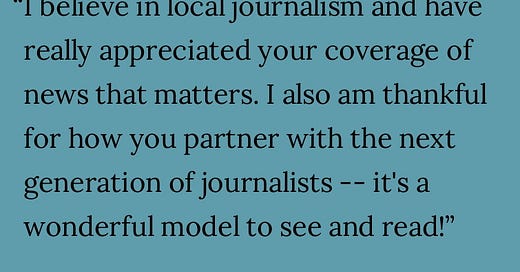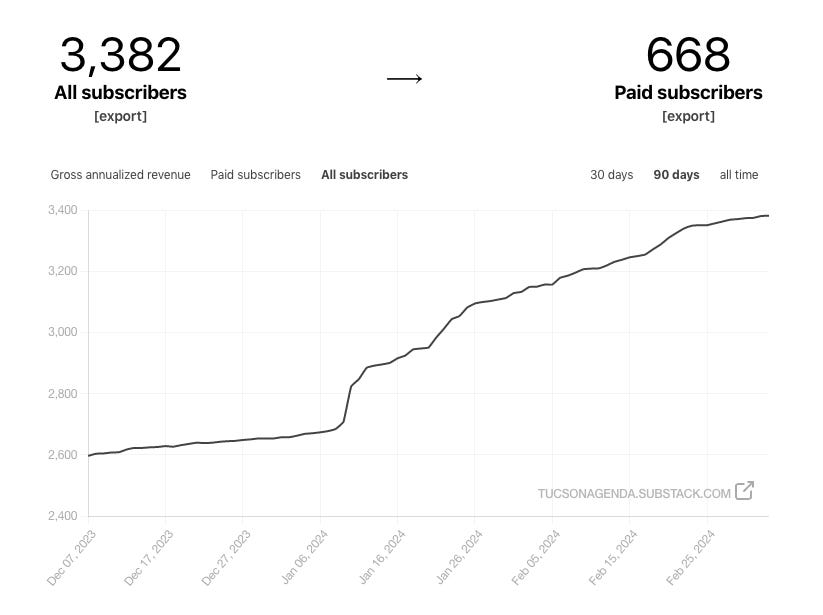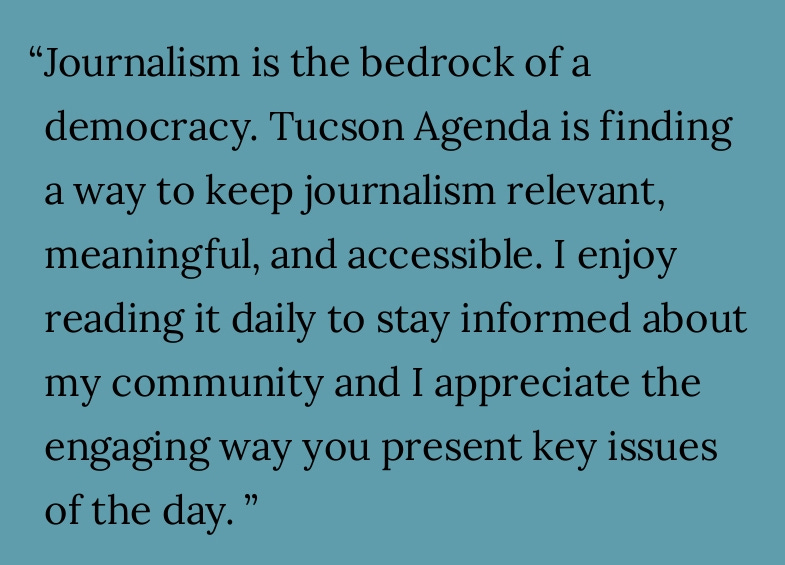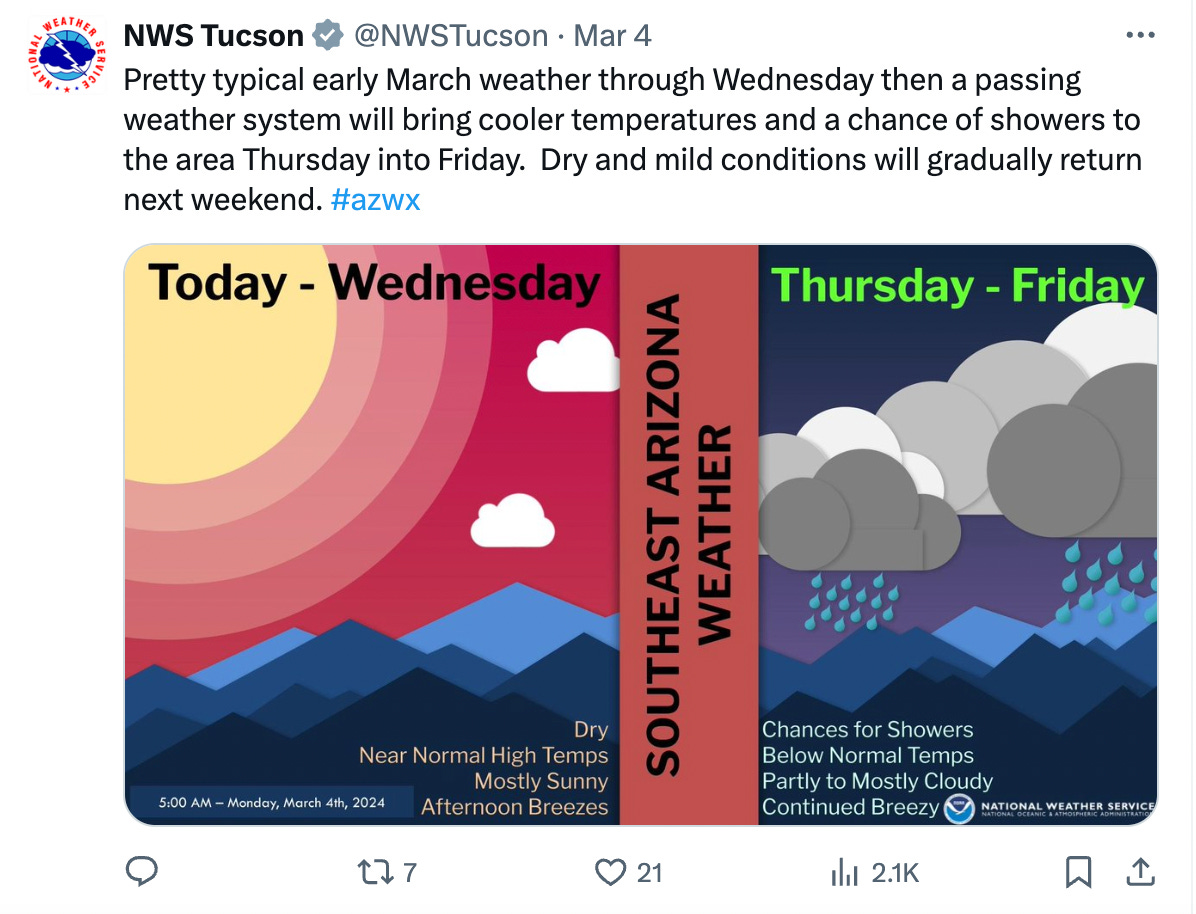The Daily Agenda: Steady as she goes
Our monthly check-in on all things Agenda ... We want to know you better ... Put those scanners to use.
Here we are again. Another month flew by.
At the end of our eighth month of publishing, we’re more optimistic than ever. We find ourselves looking ahead at how close we are to celebrating our first year, instead of counting the months since we launched and marveling that we’re still going.
We work hard to put out the best local news we can. But that’s only half of the equation. The reason the Tucson Agenda works is because you, the reader, recognize the importance of local news. So once a month, we take a step back and talk to you about the state of the endeavor.
We care deeply about local news and we see that care reflected every time one of you subscribes. And when we see hundreds of you subscribe every month, we have to pause and say “Wow, look at that!” Just last month we added 250 subscribers, bringing our total since we launched in July to nearly 3,400.
It’s hard to put into words how much it means to us when you open your wallet and buy a paid subscription. That is the lifeblood of the Agenda and an investment in a journalist-owned, reader-supported news outlet. Thanks to you, we are growing steadily and we’re now three-quarters of the way to being financially sustainable.
From the archives
Let’s get into the nitty-gritty of what we did last month.
Like always, every story we wrote last month dealt with local matters. That comes to 20 originally reported stories, along with about 120 curated stories that keep you in the flow of local news.
While we spend a lot of our time trying to find interesting ways to cover local news, we’ve also noticed a welcome development over the past month or two: you all are sending us tips and story ideas. Keep them coming!
The Climate Agenda is up and running, with features about initiatives and actions to help local people deal with the climate crisis.
Local elections are starting to take shape and we’re keeping you ahead of the game. Last month, we introduced you to candidates for constable and justice of the peace. We already did the same for the county supervisors, sheriff and county attorney. We also shared with you how we look at campaign finance reports.
One of the biggest pieces of local news these days is the UA’s budget crisis. And we’ve been right there covering it with stories about the financial implications, our struggle to get public records and the pattern of conflicting information coming from the higher-ups.
And we still keep tabs on what your local and state-level elected officials are doing, even if it isn’t the earth-shattering story of the moment. We’ve been writing briefs about the Tucson City Council and Pima County Board of Supervisors, so when Monday morning rolls around you have a pretty good idea of what you’re going to hear about the rest of the week.
We’re continuing to feature stories about homelessness and programs to support local youths, and earlier this week, we ran our first paid subscriber perk in a while. That’s something we’d like to do more.
It’s amazing what an extra pair (or three) of hands can do. Our interns are shining a light on some of the local government bodies that too often get overlooked.
Sam Parker tracked what officials in Oro Valley, Marana, and South Tucson are saying about the Regional Transportation Authority, where small towns are fighting to get their share of hundreds of millions of dollars. She also highlighted a small-loan program that helps out South Tucson residents who are struggling to keep their homes.
Liv Leonard is focusing on local school districts, including some that don’t get nearly enough attention. She also covered a program to help indigenous students adapt to life at the University of Arizona.
Desarae Tucker is handling our Instagram, LinkedIn, X, and Facebook accounts and doing her best to help Curt and Caitlin figure out how to use TikTok.
Getting to know you better
We want to know a little bit more about you, our readers.
The challenge for us is that while Substack gives us great information about subscriptions, they don’t give us much information about subscribers. They don’t want to become a clearinghouse of people’s personal information, which is great. We don’t want to do that, either.
But it hamstrings us when it comes to knowing our readers. We’ve corresponded with some of you and chatted at events, but we don’t have a clear picture of who our readers are as a whole. Right now, all we know about most of you are your email addresses.
So we designed a survey to help us get a better picture of who reads the Agenda. There are a million things we’d like to ask you, but we know you’re busy. We kept it short and sweet. Just 10 questions, mostly multiple-choice.
All your responses will be anonymous. We absolutely will not sell any of the data.
Beyond just giving us a sense of who our readers are, we’re hoping the survey will show us whether there are demographics we’re not reaching. Are young people reading the Agenda? Are we reaching people and communities who often get overlooked?
And we included a couple questions so you can sound off on what you think we’re doing poorly, or let us know where you think we excel.
So please take a minute or two to fill out the survey.
Out and about
Curt was on the Buckmaster Show talking about housing with David Godleski, president and CEO of the Southern Arizona Home Builders Association. He’s looking forward to talking with the League of Women Voters of Greater Tucson on March 16 about the future of journalism.
Caitlin’s been hard at work planning the next meeting of her solutions-focused community book club that she co-hosts with the Tucson Tome Gnome and Community Foundation of Southern Arizona. This month’s book is “Fire Weather: A True Story from a Hotter Planet” by John Vaillant and the meeting (next Thursday, March 14) includes a pre-discussion panel with a trio of local climate and sustainability experts.
The Festival of Books is coming up this weekend and Curt and Caitlin are both moderating panels of authors. We’ll be hanging around the festival both days in our Tucson Agenda T-shirts, so come find us and pick up a sticker and one of our new bookmarks.
We’re also starting to plan a party to celebrate our first birthday in July and you, readers, are invited. We don’t have the details finalized yet (it’s months away and journalists love a deadline) but you’ll be the first to know when we do.
To close things out, we have some very exciting news about our election coverage that we’ll tell you about in the next few weeks.
So long, farewell: Sen. Kyrsten Sinema said in a video announcement on X yesterday that she won’t be seeking re-election. Sinema’s exit sets the stage for a showdown between Democratic Rep. Ruben Gallego and 2022 gubernatorial candidate Kari Lake.
“Because I choose civility, understanding, listening, working together to get stuff done, I will leave the Senate at the end of this year,” Sinema said in the video. “Compromise is a dirty word. We’ve arrived at that crossroad, and we chose anger and division. I believe in my approach, but it’s not what America wants right now.”
What a waste: High-tech scanners designed to spot fentanyl crossing the U.S.-Mexico border are sitting unused in warehouses because Congress hasn’t allocated the $300 million in funding needed to install them, NBC News reports. The Non-Intrusive Inspection technology lets agents X-ray a percentage of cars and trucks as they pass through U-shaped screeners that resemble car washes. Although the screeners have been purchased, many of them haven't been put to use because the money to install them was in the supplemental funding request that was negotiated by Sinema, but blocked by Republicans.
Not so fast, lawmakers: Gov. Katie Hobbs vetoed a controversial bill Monday that would have let state and local law enforcement arrest people they believe are in the country illegally, Arizona Public Media’s Chris Conover reports. Hobbs said in her veto letter that the bill did nothing to secure the border and that it would be “harmful for communities and businesses in our state,” among other issues. She also said it presented “significant constitutional concerns.”
Cutting off clubs: The Associated Students of the University of Arizona notified clubs in an Instagram post last month that funding for the 2023-24 academic year was closed and would reopen in the fall of 2024, the Daily Wildcat’s (and our intern) Sam Parker writes. The abrupt closure just a month into the semester came as a surprise, since in past years, ASUA commonly dispersed funds well into late March and early April.
ABCs of asylum: The Arizona Luminaria’s John Washington put together a short explainer about how asylum works in the U.S. and its impacts on the region. From 2021 to 2022, the total number of asylum claims filed in the U.S. jumped from about 150,000 to more than 492,000, leading to calls to shut down the border, start mass deportations and raise the standards to receive asylum. It also prompted an outpouring of support and humanitarian aid, but a new poll shows that 80% of Americans think the government is doing a bad job of handling migrant arrivals at the U.S.-Mexico border.
Best field guide ever: Visit Tucson launched its first Mexican Food Field Guide yesterday, taking users on a tour of Tucson’s Mexican restaurants, taquerias and food trucks, the Arizona Daily Star’s Cathalena E. Burch reports.
"People travel here just for the food, and we've already been identified as a culinary destination as the first UNESCO City of Gastronomy in the U.S.," said Visit Tucson President and CEO Felipe Garcia. "This is the logical next step. Our close proximity to the border, shared history and cultural ties have forged authentic Mexican food in Tucson."
560,000: The number of page views since the Tucson Agenda launched last July.










